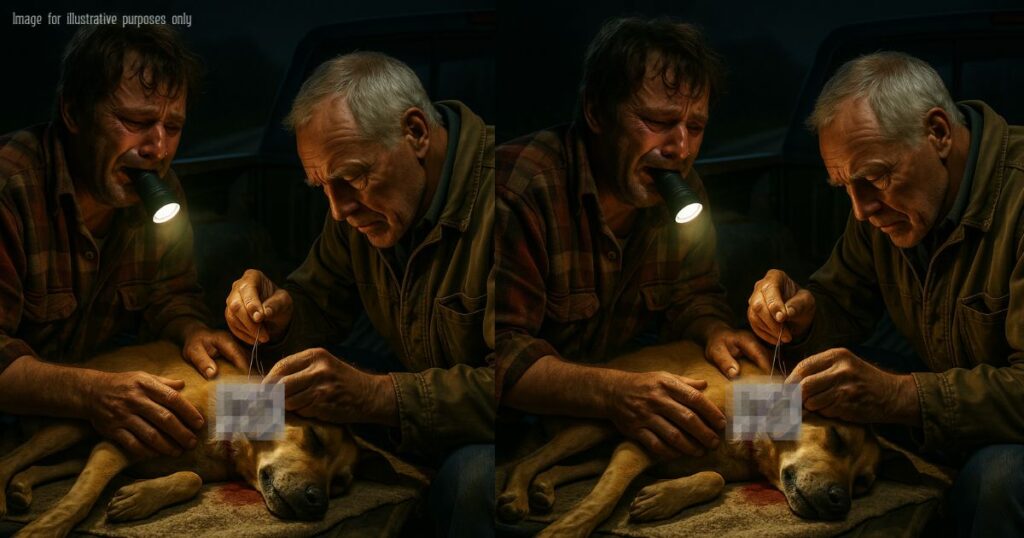Part 7 – The Promise at Miller’s Pond
I once pulled a dog out of a pond in the middle of January, just because an old man in a flannel whispered, “Don’t let him go like that.”
It was 1998, the kind of winter that made the pond look like it was breathing smoke.
I’d just finished evening rounds when the phone rang. It was Jed Miller — Vietnam vet, widower, lived on a patch of land south of town where the cattails grew taller than a man.
“Doc,” he said, voice tight, “he’s gone through the ice.”
I didn’t have to ask who he was.
Sam. Jed’s golden retriever. Twelve years old, stiff in the hips but still trailing Jed to the post office every morning. I’d patched Sam’s paw pads when he cut them on glass, pulled porcupine quills from his muzzle more than once. He was the kind of dog that made you feel better just by existing in the same county.
I grabbed my coat, tossed a rope in the truck, and drove faster than was smart on black ice.
Jed was there when I pulled up, standing by the edge of the pond in boots soaked past the ankles. The wind was pushing his breath sideways.
Sam was twenty feet out, front paws up on the jagged edge of the ice, chest in the water, trying to climb but slipping every time. His eyes found Jed and stayed there.
“I tried,” Jed said, holding out his hands, red and shaking. “Doc, I tried, but my legs…”
I didn’t wait for the rest.
The water bit like teeth when I broke through the crust. The rope around my chest felt useless compared to the pull of the cold. Sam’s nails scrabbled against my arm when I reached him. I hooked an elbow under his chest, kicked hard, and somehow we were both on the ice again.
Jed hauled us in, knees hitting the frozen mud.
Sam was limp, but breathing. I wrapped him in my coat. Jed just kept saying, “Don’t let him go like that. Don’t let him go like that.”
Back at the clinic, I got the heat lamps on him, rubbed life back into those stiff limbs, watched the steam rise off his fur. Jed sat in the corner, wet boots dripping on the tile, silent except for his breathing.
After an hour, Sam lifted his head. Looked straight at Jed. Thumped his tail once.
I swear the old man aged backward in that moment.
Sam made it through that night. And the next.
Three weeks later, he was back to his slow patrols of the property, hips stiff but eyes bright. Jed brought me a bottle of cheap bourbon and said, “Not for the dog. For me.”
We sat on the porch and had a glass each.
That spring, Sam’s hips gave out for good.
Jed called me to the house, asked if we could do it here, by the pond.
“He likes it here,” Jed said. “Always has.”
We spread a blanket in the grass. Sam lay down without being told, resting his head on Jed’s boot.
The sun was going down behind the cattails, turning the water gold.
Jed kept one hand on Sam’s neck the whole time.
When it was over, he stayed like that for a while. Then he said, “Thank you for not letting him go in the cold.”
I didn’t realize how much that stuck with me until years later, when a young vet I was mentoring asked why I sometimes go out of my way — even when I know the odds are bad.
Because sometimes it’s not about winning.
It’s about how they go.
I still drive past Miller’s Pond sometimes.
The cattails are taller than they were then. Jed’s gone now — buried next to his wife in the churchyard.
But I can still see him standing in that winter wind, boots filling with icy water, begging someone not to let his dog die alone.
There are moments in this job you carry like stones in your pocket. Heavy, but worn smooth from turning them over in your mind again and again.
This was one of mine.
I’ve been a vet long enough to know I can’t save them all.
But I can damn well make sure none of them go thinking they were forgotten.
And maybe — if I’m lucky — someone will do the same for me.
The measure of a goodbye isn’t whether you could stop it.
It’s whether you stood close enough that they knew you tried.


